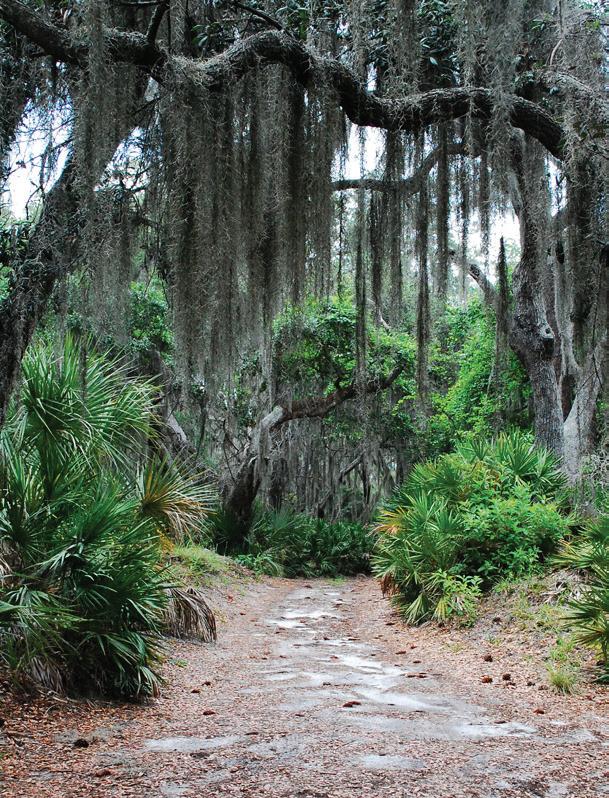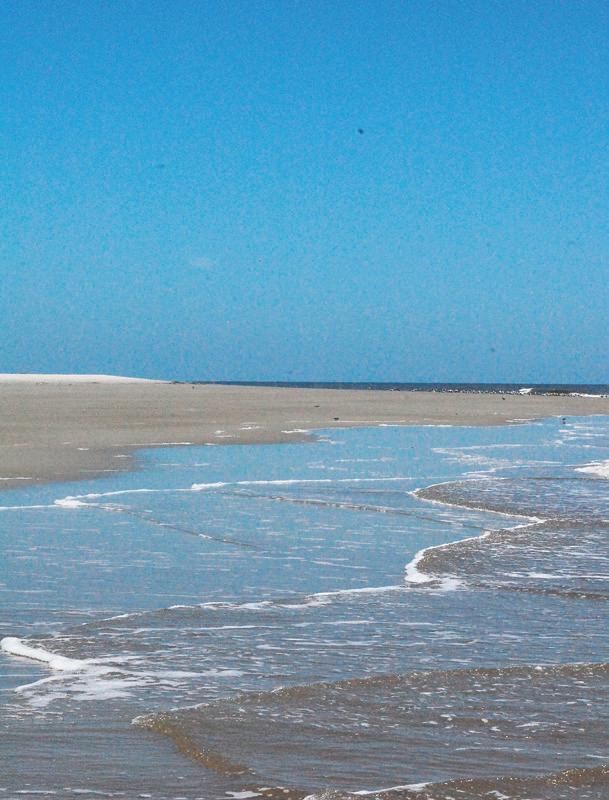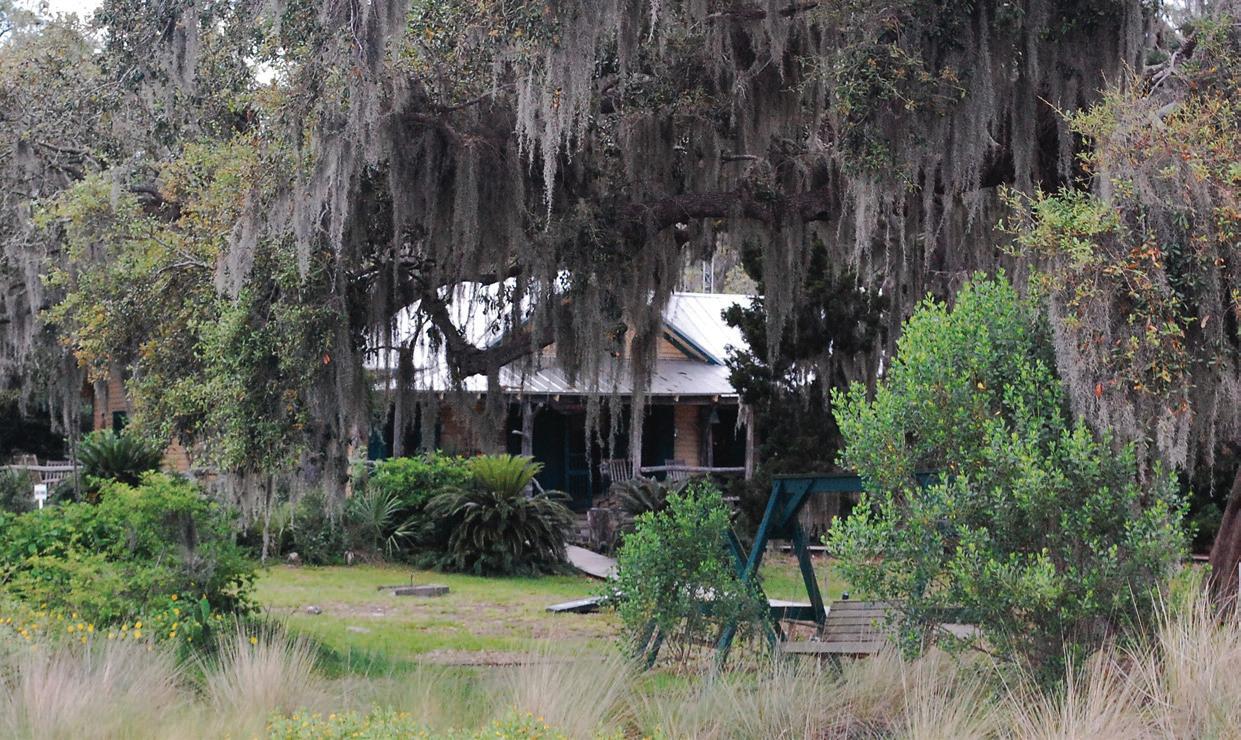
7 minute read
Lodge on Little St. Simons Island
First view of Hunting Lodge — rocking chairs, live oaks dripping moss, a swing for sunset watching, and muhly grass (sweet grass) in the foreground.
Advertisement
Article and Photos By Amy Thurman
Last fall I read a press release from One Hundred Miles listing Georgia’s Clean 13 for 2018 – businesses spotlighted by the Georgia Water Coalition for their efforts at protecting our waters and natural resources. On the list were utility companies and other industrial-type businesses, a couple individuals who’d spearheaded projects, and the “Lodge on Little St. Simons Island: Ecotourism destination protects 11,000-acre barrier island.”
I’d always assumed that Little St. Simons was either just an extension of its larger namesake with more homes and golf courses, or an uninhabited preserve like many of our barrier islands. I went in search of a website and was intrigued by what I found. Lodging, the outdoor activities our coastal area is known for led by staff naturalists, and conservation efforts that protect the island’s flora and fauna, ecology and pristine natural beauty. A unique endeavor.
After reading over the website, I wanted to know more. Surely Southern Tides readers would enjoy learning about this nearby destination, but I also wanted to share the story with the hope of encouraging other coastal businesses to explore conservation efforts. General manager Scott Greene graciously invited me for a visit.
The Lodge on Little St. Simons (LSSI) sits on a 20-acre compound on Mosquito Creek, on the eastern side of the island. The main building, Hunting Lodge, houses the kitchen and dining rooms, a den with a fireplace and self-serve bar, a museum, gift shop, activities planning area, and two guest rooms, as well as a several porches. There are additional guest quarters in Helen House, Cedar House, River Lodge, Tom House and Michael Cottage. Also on the compound are organic gardens, an orchard, the naturalist’s offices, the barn, a building shared by the tackle shop and bike shop, staff and researcher housing, and a large saltwater pool. The compound is shaded by old live oaks and slash pines and landscaped with native species plants, creating a setting that’s lovely, restful and entirely natural.
Beyond the compound are hiking and biking trails through marshes and maritime forests, picnic areas, bird blinds overlooking natural rookeries, shell middens and other historic sites, and seven miles of uninhabited beaches. While these features are enjoyed by guests, great efforts are taken to maintain the wild beauty and ensure the impact of humans is both minimal and subtle.
Environmental Integrity
It can’t be easy to find a balance between the comfort of guests
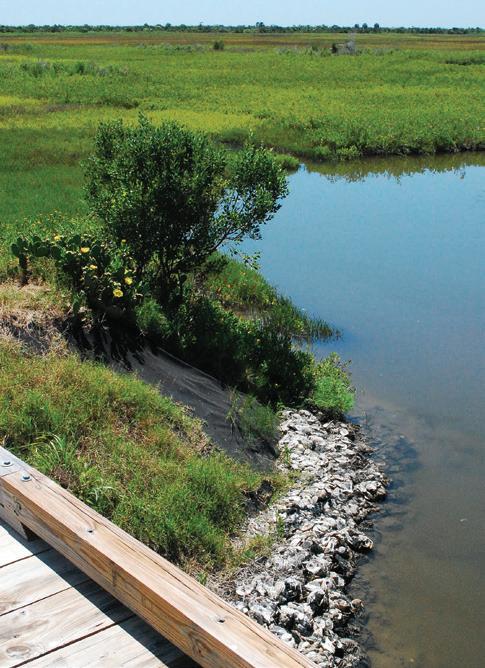
Clockwise from left: Bagged oyster shells on a living shoreline project in Mosquito Creek; Helen House guest quarters with tabby exterior; entrance to Hunting Lodge with egret statue to welcome guests; the warm and cozy dining room set for dinner; LSSI's only (so far) nesting wood storks; The 2018 Clean 13 award; the barn, now used for classes, meetings and special events.
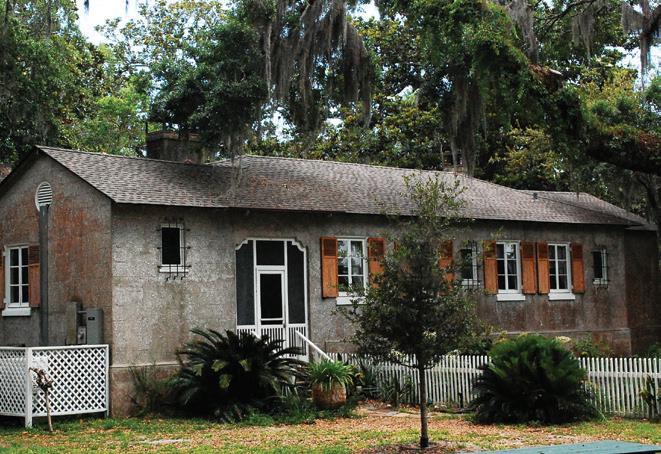
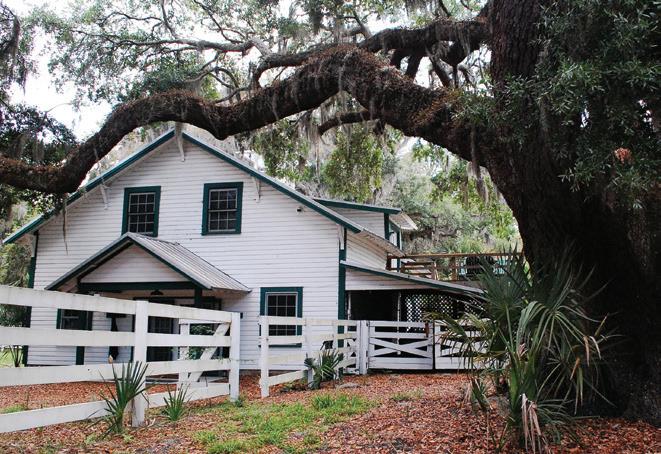
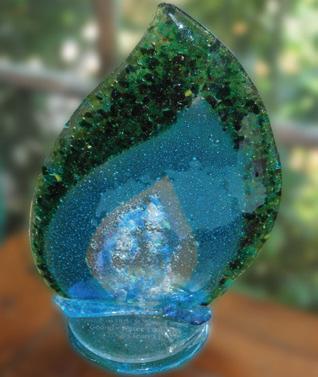
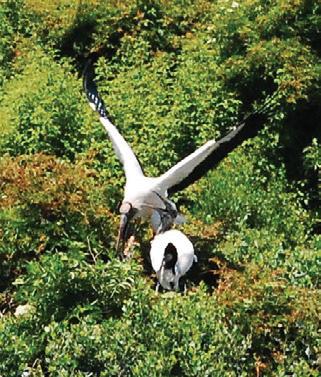
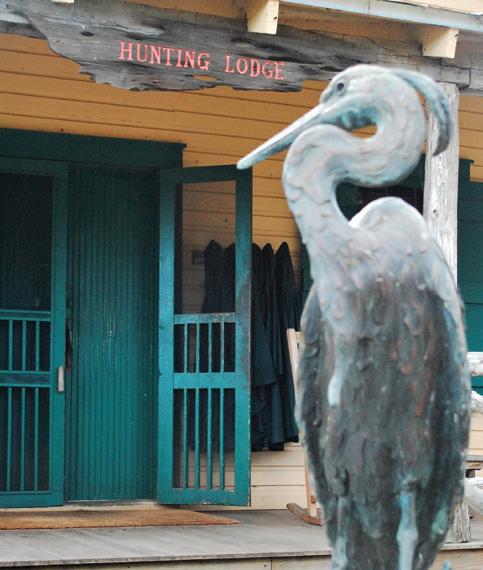
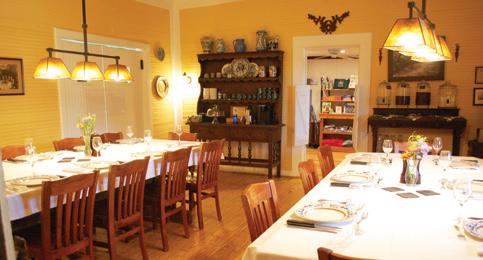

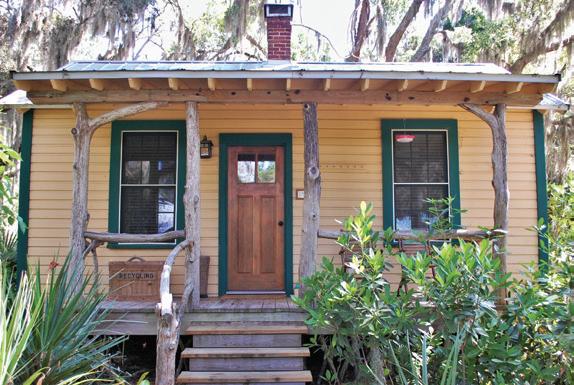
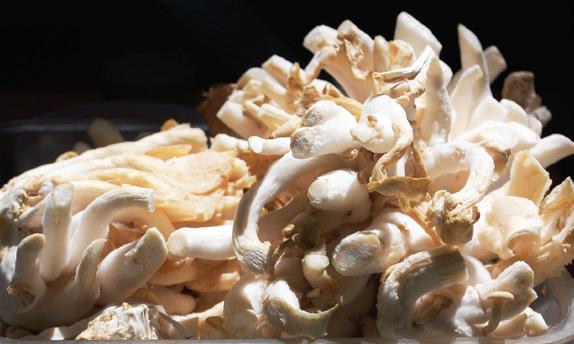
and green practices, but LSSI staff have found approaches that work and are always striving to incorporate new methods. Scraps from meal preparation and shredded office paper are composted for fertilizer for the gardens. Plans are in place to purchase a dehydrator that will allow composting of all food waste, including things that can’t currently be used such as oil, meat and small bones.
To discourage waste, guests are provided with reusable water bottles and you won’t find a disposable plastic water or soft drink bottle anywhere. The windows in guest rooms have screens so windows can be opened during cooler weather if desired. All modern energy efficiency and waste reduction practices are used and anything that can be recycled or reused, is. It's one of the few places I’ve visited where I didn’t see a single piece of trash laying around.
But for all these efforts, creature comforts aren’t compromised at all. If anything, it feels good to know that you can rest, relax and enjoy yourself and are leaving almost no footprint.
Ecology
In 2007 an Ecological Advisory Council was established to guide ecological and conservation management and research programs. Ecological Manager Scott Coleman has led the development of a 50-year conservation plan and “works to maintain, enhance and restore the natural ecological communities and wildlife populations on the island.”
In addition, a team of naturalists spend time with guests to share their knowledge of the flora and fauna and lead hands-on discussions and activities that help foster understanding of the importance of our coastal ecosystems.
LSSI also partners with multiple coastal organizations on research activities and conservation projects throughout the year.
Evidence of the LSSI’s efforts can be seen daily with living shorelines (bagged oyster shells used to restore creek banks), snags (portions of dead or dying trees left in place that provide homes for multiple species of wildlife), and native species landscaping, to name a few.
Wildlife
Animals abound on the island, from gators sunning themselves in patches of sunlight to snakes stretching across the road as they head from one location to another, to armadillos foraging for food, to rabbits and other small mammals grazing on plants, to a plethora of bird species. Plenty of opportunities arise to sit and watch them in their natural habitats if you take simple safety precautions and sit quietly.
Feeders at multiple locations draw red-winged blackbirds, painted buntings, and a variety of other species. Bird blinds at several ponds overlook rookeries with dozens of nesting birds, including great and snowy egrets, ibis, anhinga, and even the islands first wood stork nest.
Activities
There are multiple ways of exploring the island, from simply walking/hiking to riding bikes, or riding along with a naturalist in one of the island’s trucks, to kayaking or using one of the
Top: This driftwood and chicken wire gate guards the entrance to the gardens, combining natural beauty and function. Center: Tom House, a one bedroom guest cottage with living room, fireplace, screened porch and outdoor shower. Left: Fresh mushrooms locally sourced from Southern Brothers Farms (look for an article on these farmers in the near future!).
motorized skiffs. Naturalists visit with guests at breakfast and lunch each day to discuss activities based on tides, weather, and individual interests. All are welcome to participate in the planned activities or to venture off on their own.
Whether you enjoy fishing, kayaking, crabbing, birding, nature photography, swimming, shelling, or just exploring, you’ll be able to stay as busy (or not) as you’d like, and do it in the company of others or alone.
Amenities
Guest rooms are clean and comfortable, with cozy bedding and thick fluffy towels, as well as beautiful views. Complimentary drinks include tea, lemonade, ice water and coffee in the dining room, as well as local brews on tap at a self-serve bar in the Hunting Lodge and a selection of wine with dinner. Coolers with more local brews, and a variety of soft drinks and waters are also kept stocked on the porch.
Meals are a special treat, served at communal tables with large platters and bowls passed around family-style. The day’s menu is posted on the bar each morning and dietary requests are accommodated. Many of the fruits, vegetables and herbs are grown in the island gardens, while other food – meat, fish, additional produce, and specialty items such as honey and various sauces are sourced locally when possible, and baked goods are prepared fresh each day. Very little is purchased from commercial suppliers. This all adds up to fresh and delicious meals.
Coastal Treasure
Our stretch of coast is among the few remaining undeveloped expanses of marsh and wetlands in the country. The Lodge on Little St. Simons Island shares this with visitors while practicing conservation, sustainability, and educating guests about the ecology that make our coast so unique.
Many thanks to Scott Greene and all of the crew at The Lodge on LSSI for your efforts, knowledge, passion, and for sharing it all with Southern Tides!
For Day Trips or Overnight Stays: LittleSSI.com (888) 733-5774
A shaded path through the compound (at top) and this deserted beach (right) are only a few miles apart geographically, but are vastly different in terms of ecosystems. Both are easily accessible and a pleasure to explore!
